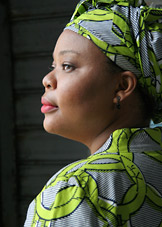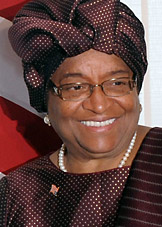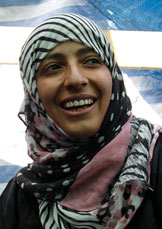
 Â Â
  
I published the column below in Velocity Weekly in 2009 after seeing the movie, Pray the Devil Back to Hell.  The movie is about Liberian women who demanded an end to rape as a weapon in the civil war terrorizing their country.  Earlier this week, Leymah Gbowee, one of the original organizers of the peaceful movement, was awarded named a Nobel Peace Prize Laureate.  She shares the honor with Liberian President Ellen Johnson Sirleaf and Tawakkul Karman, a freedom fighter in Yemen.  Many thanks to the women throughout the years who work to show peace is possible.
“Dear Women.â€
The simultaneous salutation and term of endearment followed by a simple acknowledgment of gender greeted its recipients and called them precious and highly valued.
So began countless emails I received my undergraduate years as a member of the group Black Women Jewish Women: Discovering Common Threads, or BWJW for short. My university’s student body was about 40 percent Jewish. The surrounding city’s population was just over 50 percent black.
I thought of the greeting and of the group after seeing the movie “Pray the Devil Back to Hell†in mid September. The documentary chronicles the lives of ordinary Christian and Muslim women inLiberiawho, through a series of peaceful demonstrations and petitions, and through unbreakable solidarity, brought an end to the civil war that had turned their sons still in their boyhood into war criminals, their daughters into rape victims, and their husbands into mass grave occupants. Although they had been forced into refugee camps and were essentially without resources, they accomplished a feat greater than what most heads of state have proven capable of.
In the post-show discussion, a moderator from Louisville Girls Leadership, the group that hosted the screening event, ended the discussion with two questions from the discussion guide accompanying the film: “What are some of the ways women in wealthy nations can come together to support and empower women in poor nations to fight violence in their communities and to enhance the recognition of the fundamental human rights in those places? And is it possible to do so in ways that are not ethnocentric and that truly empower women?â€
As rich as our country is, we don’t have to go international in order to find communities where women feel powerless or need a hand in stopping the violence that surrounds them. Nor do we have to go international to ask ourselves if we can leave notions of ethnocentricity behind.
BWJW hit the question head on several months into our volunteer effort at an after school literacy camp for children who attended a failing school. The children were mostly from low-income neighborhoods, and all the children were black. When the topic of the group’s biweekly discussions came around to social responsibility, the importance of continuing to volunteer at the camp came up. One of the black women asked why white people feel it’s their duty to teach poor little black children to read but don’t consider educating rich white children about privilege and prejudice.
One side heard, “we don’t need your help.â€Â The other responded, “Why won’t you examine your own prejudices?â€
This happened several years ago, so details of the verbal catfight that ensued have faded. I do remember that it caused a rift that took weeks to repair, and that even the kids at the camp felt it.
Had we made an effort to educate and empower the mothers of those children, the fallout would have been the same.  BWJW was full of scholars and leaders, women who commanded respect of their gender, race, faith, and opinions, women who believed in the power that getting to know someone has on the world. And yet, we couldn’t escape those thoughts that we were right, better, and that some of our greatness had to be imparted on the other.
The post film discussion also covered how the very nature of women played into the Liberian women’s strategy of ending war via peace. As nurturers, the women simply cared about their families and were tired of seeing of them ravaged. They called everyone in their country dear, regardless of religion or wrongdoing.
As nurturers, the women of BWJW cared about one another’s feelings. We made amends and redrew lines of respect. By examining ourselves and knowing that no one had to bite her tongue, we made the group stronger. That’s why our emails continued to begin, “Dear Women,†why I think the answers to the moderator’s questions are yes, and why a mass email that begins, “Dear Citizens of theUnited States,†is possible.
